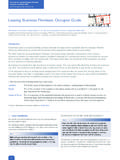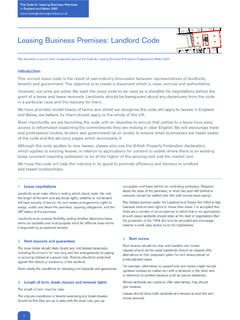Transcription of The Code for Leasing Business Premises in England and ...
1 code for Leasing Business Premisesin England and Wales 2007 Copyright The Joint Working Group on Commercial Leases, 2007. Any of the code documents may be reproduced (other than for commercial publication)without the Group s consent, but only in full, without amendment, and acknowledging the Group s NegotiationsLandlords must make offers in writing which clearly state: the rent; the length of the term and any break rights; whether or not tenantswill have security of tenure; the rent review arrangements; rights toassign, sublet and share the Premises ; repairing obligations; and theVAT status of the must promote flexibility, stating whether alternative leaseterms are available and must propose rents for different lease terms if requested by prospective Deposits and GuaranteesThe lease terms should state clearly any rent deposit proposals,including the amount, for how long and the arrangements for payingor accruing interest at a proper rate.
2 Tenants should be protectedagainst the default or insolvency of the clearly the conditions for releasing rent deposits and of Term, Break Clauses and Renewal RightsThe length of term must be clear. The only pre-conditions to tenants exercising any break clausesshould be that they are up to date with the main rent, give upoccupation and leave behind no continuing subleases. Disputesabout the state of the Premises , or what has been left behind orremoved, should be settled later (like with normal lease expiry).The fallback position under the Landlord and Tenant Act 1954 is thatbusiness tenants have rights to renew their lease. It is accepted thatthere are a number of circumstances in which that is not such cases landlords should state at the start of negotiations thatthe protection of the 1954 Act is to be excluded and encouragetenants to seek early advice as to the ReviewRent reviews should be clear and headline rent review clauses shouldnot be used.
3 Landlords should on request offer alternatives to theirproposed option for rent review priced on a risk-adjusted basis. For example, alternatives to upward only rent review might includeup/down reviews to market rent with a minimum of the initial rent, or reference to another measure such as annual landlords are unable to offer alternatives, they should should allow both landlords and tenants to start the rentreview process. Leasing Business Premises : Landlord CodeIntroductionThis revised lease code is the result of pan-industry discussion between representatives of landlords, tenants and government. The objective is to create a document which is clear, concise and authoritative. However, our aims are wider. We want the lease code to be used as a checklist for negotiations before thegrant of a lease and lease renewals. Landlords should be transparent about any departures from the code in a particular case and the reasons for have provided model heads of terms and whilst we recognise the code will apply to leases in England and Wales, we believe its intent should apply to the whole of the importantly, we are launching the code with an objective to ensure that parties to a lease have easyaccess to information explaining the commitments they are making in clear English.
4 We will encourage tradeand professional bodies, lenders and government (at all levels) to ensure small businesses are made awareof the code and the advisory pages which accompany it. Although the code applies to new leases, please also see the British Property Federation declaration, which applies to existing leases, in relation to applications for consent to sublet where there is an existinglease covenant requiring subleases to be at the higher of the passing rent and the market rent. We hope the code will help the industry in its quest to promote efficiency and fairness in landlord and tenant code for Leasing Business Premisesin England and Wales 2007 and SublettingLeases should: allow tenants to assign the whole of the Premises with thelandlord s consent not to be unreasonably withheld or delayed;and not refer to any specific circumstances for refusal, although alease would still be code compliant if it requires that any groupcompany taking an assignment, when assessed together withany proposed guarantor, must be of at least equivalent financialstanding to the assignor (together with any guarantor of theassignor).
5 Authorised Guarantee Agreements should not be required as a condition of the assignment, unless at the date of the assignment the proposed assignee, when assessed together with any proposed guarantor: is of lower financial standing than the assignor (and its guarantor); or is resident or registered smaller tenants a rent deposit should be acceptable as subletting is allowed, the sublease rent should be the market rent at the time of to be excluded from the 1954 Act should not have to be on the same terms as the tenant s ChargesLandlords must, during negotiations, provide best estimates of servicecharges, insurance payments and any other outgoings that tenantswill incur under their leases. Landlords must disclose known irregular events that would have asignificant impact on the amount of future service should be aware of the RICS 2006 code of Practice onService Charges in Commercial Property and seek to observe itsguidance in drafting new leases and on renewals (even if grantedbefore that code is effective).
6 7 RepairsTenants repairing obligations should be appropriate to the length ofterm and the condition of the expressly stated in the heads of terms, tenants should only beobliged to give the Premises back at the end of their lease in thesame condition as they were in at its grant. 8 Alterations and Changes of UseLandlords control over alterations and changes of use should not bemore restrictive than is necessary to protect the value, at the time ofthe application, of the Premises and any adjoining or neighbouringpremises of the non-structural alterations should be notified to landlords butshould not need landlords consent unless they could affect theservices or systems in the should not require tenants to remove permitted alterationsand make good at the end of the lease, unless reasonable to do should notify tenants of their requirements at least sixmonths before the termination landlords are insuring the landlord s property, the insurancepolicy terms should be fair and reasonable and represent value formoney.
7 And be placed with reputable must always disclose any commission they are receivingand must provide full insurance details on suspension should apply if the Premises are damaged by aninsured risk or uninsured risk, other than where caused by adeliberate act of the tenant. If rent suspension is limited to the periodfor which loss of rent is insured, leases should allow landlords ortenants to terminate their leases if reinstatement is not completedwithin that should provide appropriate terrorism cover if practicable todo the whole of the Premises are damaged by an uninsured risk as toprevent occupation, tenants should be allowed to terminate theirleases unless landlords agree to rebuild at their own ManagementLandlords should handle all defaults promptly and deal with tenantsand any guarantors in an open and constructive least six months before the termination date, landlords shouldprovide a schedule of dilapidations to enable tenants to carry out anyworks and should notify any dilapidations that occur after that date assoon as receiving applications for consents.
8 Landlords should wherepracticable give tenants an estimate of the costs should normally request any additional information theyrequire from tenants within five working days of receiving theapplication. Landlords should consider at an early stage what otherconsents they will require (for example, from superior landlord ormortgagees) and then seek these. Landlords should make decisionson consents for alterations within 15 working days of receiving code for Leasing Business Premisesin England and Wales 2007 negotiationsYou should expect the Landlord to make very clear exactly what youare being asked to should be able to understand the total extent and duration of thecost and liability you will be taking on if you sign a lease based on theterms being offered by the should know from the offer exactly what the property should also remember that, however good your relationship is orseems to be with the Landlord, the Landlord may sell to another party.
9 The terms you agree and the lease you take on must reflect everythingyou rely on to conduct and safeguard your 1 Make sure you understand every term and condition in the offer including the total cost until the lease ends and ask theLandlord or the Landlord s representative to confirm in writingthat the offer meets the Lease 2 Make sure the offer clearly shows the extent of the property,with the boundaries clearly marked on plan and the floor areanoted, together with all means of access, any access or areasyou must share with other occupiers, any limitation of hours ofuse, any restrictions in the type of use, any legal or planninglimitations or obligations that come with the property. Leasing Business Premises : Occupier GuideIntroductionA Business lease is a legally binding contract between the legal owner (Landlord) and the occupier (Tenant).
10 Failure by either party to comply with the terms of the agreement could result in court 2007 code for Leasing Business Premises ( the Lease code ) provides a framework within which a prospective tenant can reasonably expect a landlord to operate. As a prospective tenant, you should not assumethat a landlord complies with the Lease code . The Lease code does not provide all of the protection you need for your Business in Leasing the Landlord is also the tenant of another owner. This may restrict the flexibility of terms the Landlordcan offer. The Landlord should always state in advance if this is so and provide a copy of the current it is proposed to buy an existing lease (assignment) from someone else, be aware that, though parts of thisOccupier Guide may help in interpreting some of the terms of the lease, there may be many additional advice from a qualified surveyor and a lawyer should be this document the following terms have been used:LandlordThis is the owner of the property or the person owning an existing lease of the property TenantThis is the occupier of the property or the person paying rent to a landlord (this Occupier Guideassumes the tenant will be you)Heads of TermsThis is a summary of the agreement between the parties and is used to instruct lawyers to produce the formal lease.





